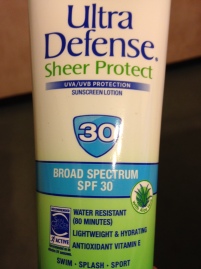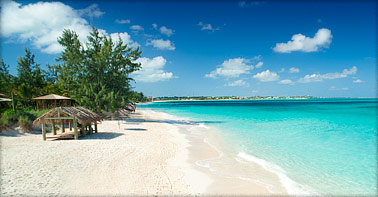I’m sure I’m not the only one who’s been counting down the days till spring break – I can’t wait to be in the sunny Turks & Caicos where it’s currently 81 degrees! I know a lot of people will also be soaking up the sun next week, so I thought I’d write a post about protecting your skin and preventing skin cancer. My mom has had a few scares with cancerous spots because she grew up at the beach not wearing any sunscreen, so I try to be really cautious. Plus nobody wants to look like a lobster the second day of vacation and attempting to take even a (luke)warm shower will be a struggle.
To limit your sun exposure, take some shade breaks under an umbrella especially between 10am and 4pm when the UV rays are the strongest. Wearing clothing can also prevent your skin from getting exposed to UV rays, but not all clothing protects completely. If your skin burns easily (I’m looking at you, gingers), consider buying special clothes that protect your skin even when it’s wet, while still being lightweight and comfortable. Wear sunglasses that ideally block 99% to 100% of UVA and UVB rays – look for a label that says “UV absorption up to 400 nm.” To keep your beautiful face from burning, consider wearing a hat too.
I’ve heard many myths about sunscreen, especially about SPF, and didn’t think to look up the facts until writing this. Here’s a picture of the sunscreen I just bought for my trip (because it seemed legit), but let me break it down for you about what you should look for when you’re picking up your sunscreen:

- It’s best to wear sunscreen with broad spectrum protection, which protects against both UVA and UVB rays.
- Your sunscreen should be an SPF of 30 or higher. The SPF scale works like this – SPF 15 sunscreens filter out about 93% of UVB rays, SPF 30 about 97%, SPF 50 about 98%, and SPF 100 about 99%. Lower than SPF 15 15 has been shown only to help prevent sunburn, not skin cancer or early skin aging (ain’t nobody got time for wrinkles, so just buy a higher SPF).
- Sunscreens can claim to be “water resistant,” but they have to state whether they protect the skin for 40 or 80 minutes.
- Reapply every 2 hours.
I hope everyone has a delightfully relaxing and fun spring break! Campus Health just posted a really insightful blog about how important relaxing is for your well-being, and it discusses a ton of tangible benefits of relaxing. Keep a lookout for more posts from me next week – beach reading perhaps?
